Where do great ideas come from? Tertiary institutions are adopting the ‘ideas incubator’ model to empower students into an entrepreneurial mindset and facilitate a dynamic cross-pollination of ideas.
January 18th, 2019
Small and medium-sized businesses are an important part of any given economy, as are the entrepreneurs who start them. In today’s fast-changing world these movers, shakers, creatives, influencers and ‘ideas people’ are one step ahead of the pack and breaking new ground because of it. Entrepreneurship is a valuable currency: it drives innovation, strengthens market competition and creates new jobs – all of which lead to economic growth. Little wonder universities are committed to building an entrepreneurial spirit in students (and the wider community) by making the teaching and learning of entrepreneurship a key priority.
The role of architects and designers is to provide environments that facilitate these activities through the use of new spatial designs based on current pedagogies. But as Geyer’s recently appointed education sector leader, Nolita Ryan, notes, there’s never a one-size-fits-all solution. “We need to know what’s keeping our clients awake at night and how to best address that. And while we run an intensive briefing process, we also recognise there [are] three mutually supportive elements that underpin our education projects: innovation, technology and entrepreneurship.”
Clients are increasingly requesting innovation hubs and incubators on campus and calling for design outcomes that better foster industry engagement. Both responses emphasise a focus on entrepreneurship, enabled by technology and innovation, where the student-centred approach of blended learning encourages a socially negotiated process of study. Certainly, classrooms are no longer the traditional cellular-type spaces of yesteryear and the new open plan model, incorporating a range of settings, is even being applied across other areas of university campuses.
The message being delivered is that the learning never stops. “Branding is very important to universities,” says Ryan. “As is a clear representation of their culture.” In Geyer’s recently completed Curtin Connect project in Perth, the refurbishment of Curtin University’s customer and student services area very much sets the tone for the institution’s progressive learning approach. Through respecting the architectural integrity of the 1960s building, Geyer’s project team ensured the front-of-house experience was made as comfortable as possible by providing private spaces for consultation, shared lounge areas and technology-rich work zones.
Students are encouraged to take ownership of their administrative experience and the different settings make it a place where they actually want to hang out. By owning their experiences on campus, students are also made to feel empowered, an advantage for tomorrow’s generation of entrepreneurs. This go-getter, anything-is-possible attitude underpins any start-up business, while also being a fundamental principle upon which so-called innovation hubs are built.
In the new Architectus-designed Macquarie University Incubator young businesses are invited to use the space, with academic staff and students able to meet and interact with these industry-aligned start-ups via curated opportunities. “This place is all about nurturing good ideas and integrating academic thinking and research to accelerate those ideas into realistic outcomes,” says Architectus principal Luke Johnson.
Importantly, the interior needed to be flexible to accommodate the expansion of these businesses, so Johnson, along with project architect Nick Elias and team, conceived a modular prefabricated long span timber building that essentially accommodates all of the structure on its exterior. Not only does this make for a striking expression against the campus’ bushland setting, but it also allows the fit-out to be rapidly changed and adapted by either moving loose furniture around or rearranging partitions.
As Johnson continues: “Part of the recipe for making incubators successful is to introduce diverse people into the space who can intersect and serendipitously engage with one another. We can’t prescribe how people are going to work or socialise in their everyday life, but we can give them rich environments that encourage chance interactions.”
Indeed, collaboration and communication are key to achieving entrepreneurial outcomes and so constant exposure to other people is imperative. Having a highly transparent interior (even the private meeting rooms are glass enclosed) and diverse settings means there’s no avoiding anyone. Visibility also breeds friendly competition and pushes each nascent business to be bigger and better. The incubator model is so effective that it’s being applied beyond the university campus.
MPavilion is one such example where education and its influence are embraced in a cultural context as the foundation for a free public program intended to inspire and inform. The pavilion, which pops up for the summer months of every year, was designed in 2017 by OMA with a special focus on facilitating the exchange of knowledge and generation of new ideas within creative industries. Programming was executed with the intention of bringing the best minds in the business together to collaborate, workshop and debate.
Entrepreneurs are nothing without a good idea and having access to environments that enable the sowing of the proverbial seeds is crucial. Knowledge is power, after all, and with it comes the ability to affect change. The need for learning can’t be underestimated and while universities have an important role to fill in this regard, it’s also important that the learning continues post-graduation.
Economic growth depends on it – as does society which benefits from the positive thinking, collaborative nature and self-starter approach that entrepreneurial individuals bring.
The Macquarie University Incubator space by Architectus won The Learning Space category, proudly partnered with Living Edge, at the 2018 INDE.Awards. Be at the forefront of design in the region – entries are currently open for 2019!
INDESIGN is on instagram
Follow @indesignlive
A searchable and comprehensive guide for specifying leading products and their suppliers
Keep up to date with the latest and greatest from our industry BFF's!
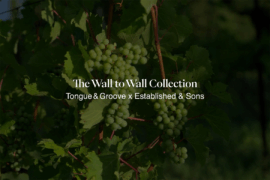
London-based design duo Raw Edges have joined forces with Established & Sons and Tongue & Groove to introduce Wall to Wall – a hand-stained, “living collection” that transforms parquet flooring into a canvas of colour, pattern, and possibility.
The new range features slabs with warm, earthy palettes that lend a sense of organic luxury to every space.

Richmond came alive for Saturday Indesign 2025 as showrooms, rooftops and laneways transformed into a celebration of design, creativity and connection.
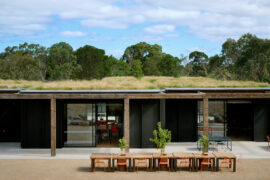
McIldowie Partners, in association with Joost Bakker, has been awarded The Learning Space at the INDE.Awards 2025. Their project, Woodleigh Regenerative Futures Studio, redefines the educational environment as a living ecosystem that nurtures sustainability, innovation, and community.
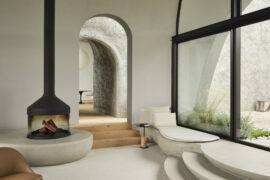
Leeton Pointon Architects and Allison Pye Interiors have been awarded as the winner of The Living Space at the INDE.Awards 2025 for their exceptional project House on a Hill. A refined and resilient multigenerational home, it exemplifies the balance of architecture, interior design and landscape in creating spaces of sanctuary and connection.
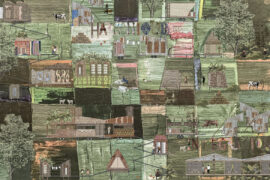
Annabelle Smith has been named winner of The Graduate at the INDE.Awards 2025, in partnership with Colorbond. Her visionary project reimagines housing in Aotearoa, proposing a modular and culturally responsive model uniting people, architecture and nature.
The internet never sleeps! Here's the stuff you might have missed
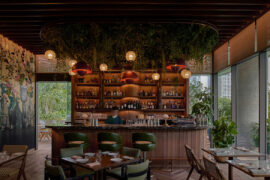
Grounded by the rich warmth of American white oak, The Standard’s newly opened restaurant, Kaya, redefines the classic dining convention through a tasteful fusion of biophilic design, mid-century modern sensibility and elevated whimsy.

In this comment piece, COX Principal David Holm reflects on Carlo Ratti’s curatorship in which climate, colonisation and gender equity took centre stage at the Venice Biennale.
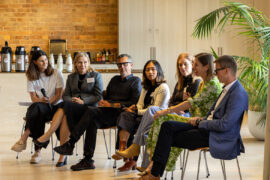
In this comment piece by Dr Matthias Irger – Head of Sustainability at COX Architecture – he argues for an approach to design that prioritises retrofitting, renovation and reuse.
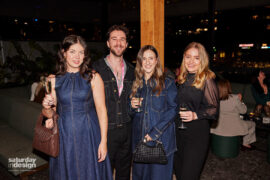
On 6th September 2025, Saturday Indesign went out with a bang at The Albion Rooftop in Melbourne. Sponsored by ABI Interiors, Woodcut and Signorino, the Afterparty was the perfect finale to a day of design, connection and creativity.